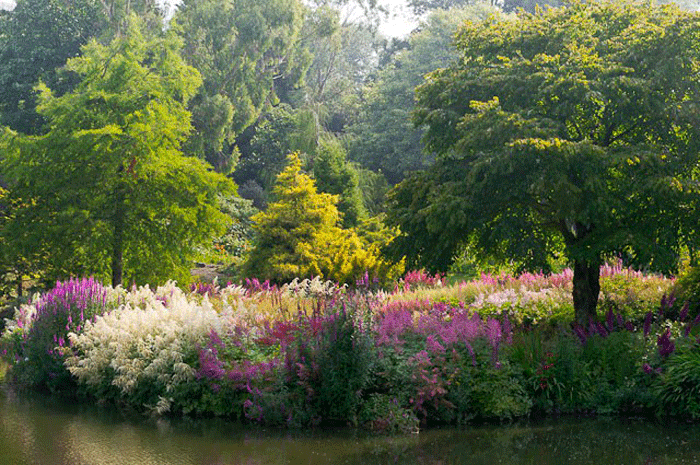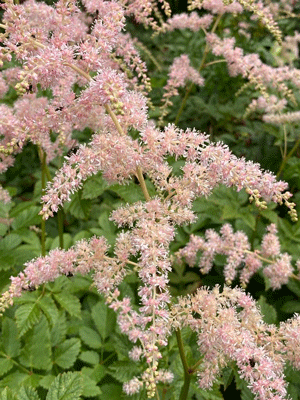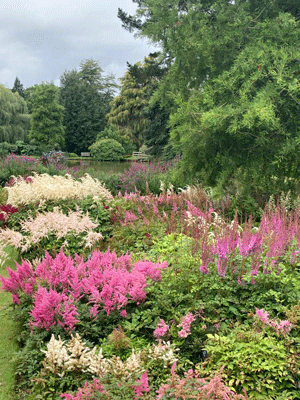Brickell Award 2020 awarded to Astilbe grower
 Horticultural charity Plant Heritage has awarded its prestigious Brickell Award for 2020 to north Devon based Malcolm Pharoah for the National Plant Collection of Astilbe held at Marwood Hill Gardens.
Horticultural charity Plant Heritage has awarded its prestigious Brickell Award for 2020 to north Devon based Malcolm Pharoah for the National Plant Collection of Astilbe held at Marwood Hill Gardens.
Malcolm was presented with his award at a small, socially distanced presentation on Friday 24th July, 2020, by John Webster, Vice Chairman of Plant Heritage’s Plant Conservation Committee.
The Brickell Award (named after Plant Heritage’s founding member and current Vice-President Chris Brickell) recognises excellence in cultivated plant conservation and celebrates the extensive conservation work achieved by one of the charity’s 400 National Collection Holders each year.
 Malcolm (pictured left with his award) started his Astilbe collection in the 1970s, when he worked as Head Gardener at Marwood Hill Gardens. In 1991 it was awarded full National Plant Collection status and now, 30 years on, Malcolm has collected eight different species of Astilbe and over 200 cultivars, many of which are rare. They are all growing in 20 acres of landscape gardens and much enjoyed by visitors to Marwood Hill Gardens, near Barnstable, north Devon.
Malcolm (pictured left with his award) started his Astilbe collection in the 1970s, when he worked as Head Gardener at Marwood Hill Gardens. In 1991 it was awarded full National Plant Collection status and now, 30 years on, Malcolm has collected eight different species of Astilbe and over 200 cultivars, many of which are rare. They are all growing in 20 acres of landscape gardens and much enjoyed by visitors to Marwood Hill Gardens, near Barnstable, north Devon.
Malcolm has now retired as head gardener at Marwood Hill, but he still actively works on the collection and in the gardens as a volunteer, very much a key and well respected member of the team.
Asked how he became interested in Astilbe, Malcolm will tell you that it was when he was a student at RHS Garden Wisley in the early 19701: “We used to go to the Chelsea Show and one exhibit was by Bees of Chester nursery and they had banks of spectacular Astilbes in their display,” he recalls. “When I came to Marwood Hill Gardens after, there were several Astilbes planted around the lakes and the collection has grown since then.”
He will tell you that there is a huge range of Astilbes suitable for all gardens and they make excellent garden plants with a wide range of colours and shapes of flower spikes: “The dwarf growing forms are suitable for drier soils as the taller ones prefer more moisture,” he says. “Many these days have attractive foliage, often in the spring the foiliage is reddish before it changes to green, however, some keep the bronze colour all season.”
 Malcolm also points out that there are some new forms that have yellow or golden foliage and that Astilbes are as tough as old boots and very hardy and reliable to come up each year: “As long as they are lifted and divided every four to five years and replanted from October to March, this rejuvenates and gives them vigour. It also means you have more plants to plant or give away.” (pictured right: Astilbe ‘Betsy Cuperus’ raised by B Ruys in Holland in 1917 and Merit Holland 1917.)
Malcolm also points out that there are some new forms that have yellow or golden foliage and that Astilbes are as tough as old boots and very hardy and reliable to come up each year: “As long as they are lifted and divided every four to five years and replanted from October to March, this rejuvenates and gives them vigour. It also means you have more plants to plant or give away.” (pictured right: Astilbe ‘Betsy Cuperus’ raised by B Ruys in Holland in 1917 and Merit Holland 1917.)
Vicki Cooke, Conservation Manager, Plant Heritage says: “Malcolm has been a pivotal member of our Devon Group since 2007, and has served on the committee for 10 years too. His ongoing passion and dedication for conserving garden plants is just what the Brickell Award is all about, and we’re thrilled to honour his work and Marwood Hill’s beautiful Astilbe collection, in this way“.
Also known as ‘false goatsbear’’, Astilbe produces elegant plumes of flowers, from shades of rosy-pink to pure white in late spring and summer. They are easy to grow shade-tolerant plants and can be found in a variety of sizes from small plants that fit perfectly in a boarder to much taller varieties that can reach an impressive two metres in height.
 Speaking about his award, Malcom says that he is delighted to have won it this year: “I’ve loved Astilbe for many years and throughout my career I’ve cared for and grown as many varieties as possible as well as researching new varieties. Our collection at Marwood Hill Gardens is looking particularly striking at the moment, as our Astilbes are in full bloom, so we hope that lots of visitors will be able to come and share our enjoyment of them soon.”
Speaking about his award, Malcom says that he is delighted to have won it this year: “I’ve loved Astilbe for many years and throughout my career I’ve cared for and grown as many varieties as possible as well as researching new varieties. Our collection at Marwood Hill Gardens is looking particularly striking at the moment, as our Astilbes are in full bloom, so we hope that lots of visitors will be able to come and share our enjoyment of them soon.”
Also present at the award ceremony were Lucy Pitman, Plant Heritage’s Plant Conservation Officer, Beth Smith, Collection Holder of Phlomis, Matt Brewer, the new head gardener and Patricia Stout, Property Manager, both from Marwood Hill Gardens.
Below Malcolm share his top five tips for growing Astilbe:
1. Lift and divide plants after four or five years, and replant them from October to March
2. Low growing forms of Astilbe tolerate drier conditions more than the taller varieties
3. Astilbe grows better in full sun if there’s an adequate supply of water
4. But, Astilbe will grow in shade and under trees, if the soil is drier
5. Finally, Astilbe are as tough as old boots! They are very hardy and rarely suffer from any pests.
To find out more about Marwood Hill Gardens visit: www.marwoodhillgarden.co.uk
To find out more about Plant Heritage and its National Plant Collections please visit: www.plantheritage.org.uk
Photo credits: Image of Malcom top left, credit Patricia Stout, Marwood Hill Gardens; all other images Marwood Hill Gardens.

